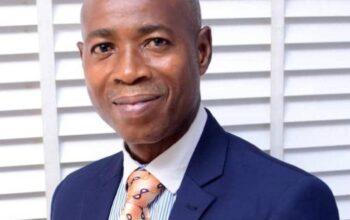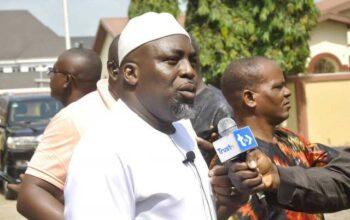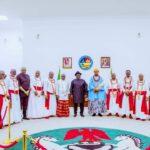Following the lifting of restrictions on places of worship, the federal government has issued a safety advisory, which among others, restricted children from churches and Islamiyya schools in mosques, as part of measures to contain the spread of COVID-19 during regular religious services.
The federal government has also asked governors to take charge of the enforcement of the protocols to contain the spread of the virus.
In Lagos and Kaduna states, the governments have said places of worship would remain closed.
The virus’ tally rose to 11,166 in the country Wednesday June 3,2020, having infected 348 more persons.
The number of deaths rose to 315 with 3,329 persons so far discharged.
The advisory to churches and mosques, which was developed in liaison with the leadership of the religious community and state governments, was reeled on Monday by the National Coordinator of the Presidential Task Force on COVID-19 Control, Dr. Sani Aliyu, during the task force’s media briefing in Abuja.
He, however, insisted that it’s safer for the public to worship at home because religious places are particularly recognised to have the major potential of spreading the virus among worshippers, saying that places of worship that are unable to comply with the measures should not be allowed to operate by governors.
Aliyu said the advisory was issued in the event that members of the public wanted to perform their spiritual needs and it’s impossible to carry it out at home.
Some of the recommended guidelines, which PTF noted are minimum standards that mosques and churches must comply with include, the supply of running water, soaps and alcohol sanitisers at entry and exit points and in all high contact locations, including bathroom. He added that worshippers must sanitise their hands and undergo temperature checks before entry.
The use of face masks is now mandatory in mosques and churches, while all close contacts, including shaking of hands, hugging, kissing, handling out of materials and sharing of worship items, including prayer mats, musical organs, and microphone is strongly discouraged.
”The capacity of the facility should be limited to allow for physical distancing rules to apply. Local authorities should also be advised in terms of areas of hotspot that might require greater restriction. Volunteers should be restricted to a certain number and none of the volunteers should have an underlying condition or be above the age of 55 years,” Aliyu said.
PTF also recommended limiting congregation time for places of worships, only opening for regular church and mosque services.
Under this proposal, churches are to open from 5.00 a.m. and close by 8.00 p.m. automatically ruling out night vigils.
Each church service would be for a maximum of one hour with an interval of 30 minutes in between services to allow time for disinfection.
Mosques may open 15 minutes before Adhan (call to prayer) and close 10 minutes after prayer for fajr, subr and asr. Prayers are to be shortened to reduce contacts between congregants.
”The reason for this, as I said yesterday, is that there are various factors that contribute to you catching COVID-19 when you come across somebody with it. And one of the factors is the duration with that person. The longer you stay with that person, the less protected the person is in terms of face mask – or you yourself. The closer you are to the person, the higher the likelihood of catching COVID-19,” he said.
He added that for Friday Jummat prayers, mosques are to open 20 minutes before prayers and close 20 minutes after prayers. The duration of Friday prayers, including sermons, should not exceed an hour, he said.
Similarly, Aliyu also noted that Islamiyya schools, children’s Sunday schools and children’s activities, as well as night vigils, are to remain suspended, adding that for mosques, only five daily prayers and Friday Jummat service are permitted.
According to him, mass gatherings that make it impossible to enforce physical distancing are not allowed, while it’s advised that prayer sessions should be staggered to accommodate people.
Aliyu also said church worshippers should be encouraged to sign up for preferred service time, while virtual worship options should be made available, adding that if possible places of worship should plan for separate entry and exit point, while no social gathering before and after service should be allowed.
He also strongly objected to operation of business outlets within churches and mosques, saying they should remain closed while people with underlying conditions, such as HIV, diabetes, cardiovascular diseases, cancers and those above 55 years are advised to stay at home and consider remote participation or non-contact attendance.
”When we look at the mortality rate for people who have died from COVID-19 in Nigeria, more than half of those that died were above the age of 50. Secondly, the case fatality rate if you are above the age of 50 is 17 per cent; if you are above the age of 60; it’s 18 per cent – it is almost one in five chances of dying if you catch COVID-19 and you fall within that group.
There should be improved environmental hygiene and clear decontamination processes. For instance, places of worship should ideally be free of carpets to allow easy and regular disinfection of floors and furniture. Windows should be left open during service and preferably use non-enclosed open-air services as much as possible,” he explained.
He reminded worshippers not to attend in person if they are experiencing common symptoms of COVID-19, including fever, cough, and shortness of breath or have had close contact with an infected person in the last 14 days.
Also speaking at the briefing, the Chairman of the task force, Mr. Boss Mustapha, said the task force would continue to monitor the progress and keep the option of review of the protocols open should such needs arise.
He said while the federal government had issued so many protocols with regards to business places and places of worship, the responsibility for the enforcement is ultimately with the state governors and security agencies.
Mustapha noted that governors have the responsibility to superintend over their territory, adding that the federal government wants to see enforcement that applies to confinement of the governors’ responsibility and jurisdiction.
”The governors have the responsibility to superintend over their territory. Most of the issues we want to see enforcement applied are things that attend to the confines of their responsibility and jurisdiction to ensure enforcement in those areas.
”I can assure you that I have seen some of the governors in action. I am quite satisfied with the level of enforcement that they have demonstrated. They might not all be in the same category; some have been quite decisive in dealing with this pandemic, some probably because of the numbers they have not been that decisive in the open as you will see with certain governors that are working very hard to ensure that they limit the rates as much as possible – the rate of transmission into their territory.
“And now that the virus has ceded itself into parts of the country, every governor will have to take ownership of this level of driving home everything that has to do with our response to this pandemic. This is the time for the governors to stand out for their people and ensure the implementation of the guidelines,” Mustapha said.









